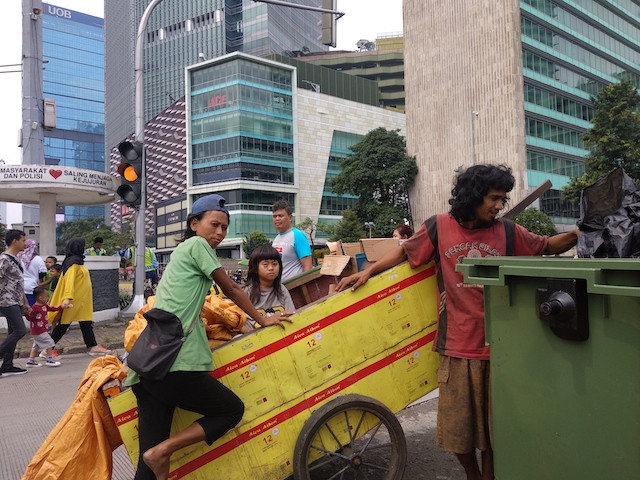Popular Reads
Top Results
Can't find what you're looking for?
View all search resultsPopular Reads
Top Results
Can't find what you're looking for?
View all search resultsScavengers work under radar to help reduce waste
Scavengers are often overlooked but they help the city's waste recycling efforts.
Change text size
Gift Premium Articles
to Anyone
B
arefooted, Azis Syahputra and his wife stroll around the Hotel Indonesia traffic circle in Central Jakarta on Sunday to collect plastic bottles littered by participants of the weekly Car Free Day.
His 7-year-old daughter helped arrange the bottles in the cart he pulled, while sometimes asking her parents to buy her a drink. They searched deep into trash bins to look for plastic bottles. Sometimes, Azis has to go far into a gutter to find the trash that can be turned into money.
With their soiled shirts and ripped pants, they roam around the city daily. They end their work only after they feel exhausted and return to their small rented room in a house in Menteng, Central Jakarta, where eight other families of scavengers also have rooms.
If they are lucky, they are able to collect 14 kilograms of waste, which means they can pocket Rp 50,000 (US$3.50) from the garbage collector.
“That’s not a lot. But we try to be grateful,” said the 35-year-old Aziz, who came to Jakarta from Cilacap in Central Java 22 years ago. The great deal of adversity they faced had even evoked the thought of selling their child for money. “But we’re advised [by other scavengers] not to and we began to think she may have a better future.”
“We just try to earn enough to cover our daily needs,” he said, adding that he was committed to supporting his daughter in pursuing an education.
Once his cart is full, he stores the waste with a garbage collector, locally known as a pengepul. After the waste is sorted, it is sent to a factory to be recycled.
“We can actually directly send the waste to the factory and earn more, but it would be too energy-draining and time-consuming to take a cart to the factory in Kapuk Muara, Penjaringan, North Jakarta,” Azis said. “That’s how pengepul play their role, as they send the waste once in a month via trucks.”
There are about 25,000 scavengers in Jakarta and its surrounding area, according to the Indonesia Scavengers Association (IPI). Many of them are stationed at the Bantar Gebang dump site in Bekasi, West Java, where Jakarta’s 7,400 tons of waste are disposed daily.
Annually, the capital produces 2.5 million tons of waste, 357,000 of which is plastic. Not all of the waste can be dumped at Bantar Gebang, the only landfill for Jakarta’s waste, which is to reach full capacity in 2021. Some of the untreated waste pollutes the city’s rivers and ends up becoming marine debris.
Data from the city’s environment agency reveals that the accumulation of plastic waste in Jakarta’s rivers has created a layer of sediment 50 centimeters thick, which can cause floods.
“Plastic is our money so we do anything for it. I don’t mind having to dive into a gutter to collect it,” Azis. “We sometimes go to places the orange troops do not reach,” he added, referring to the city’s official team for cleaning up waste.
The efforts of the scavengers are important to help the city sort the types of waste. Although the administration has launched a waste bank program, which encourages residents to collect waste and sort it based in exchange for money, it has yet to gain popularity citywide.
Although there were no formal agreements between the administration and the scavengers, the agency’s waste management division head Rahmawati admitted that they had contributed to the city’s waste recycling efforts.
Despite their contributions, scavengers are often confronted by the city’s Public Order Agency officials and the activity is highly associated with social illness.
Azis acknowledged there are scavengers who take things they should not.
Even though the prejudice against them does not show signs of ending, the work continues to attract people. Dewi Anggraeni, 33, who came to Jakarta from Pemalang, Central Java, 16 years ago, said that many people from outside the capital come to the city to become scavengers.
“The competition gets tougher every day,” she said.










